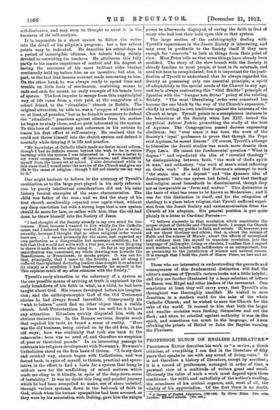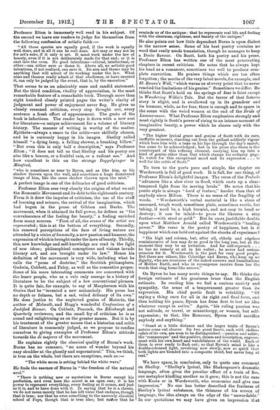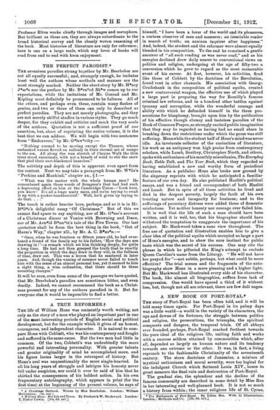PROFESSOR ELTON ON ENGLISH LITERATURE: 1 " PROVESSOR ELTON describes his work
as "a review, a direct criticism, of everything I can find in the literature of fifty years that speaks to me with any sound of living voice." It is not therefore a history of literature, except by accident; it is a record of preferences, arranged in order of time, a personal view of a multitude of writers great and smalL Obviously the value of such a work must depend upon three conditions : the width and catholicity of the author's reading, the soundness of his critical organon, and, most of all, the vitality of his appreciation. Of the first there is no doubt.
• A Berkey of English Litaretwre, 1780-1830. By Oliver Elton. Two vote, London ; Edward Arnold. [21s. Professor Elton is immensely well read in his subject. Of the second we leave our readers to judge for themselves from the following confession of artistic faith:—
"All these species are equally good, if the work is equally well done, and in all it can be well done. Art may or may not be for art's ;aka, if it only is art. It must work under the law of beauty, even if it is not deliberately made for that end; or it is cast into the oven. No good intentions—ethical, intellectual, or -other—can either save or damn it. Above all, no artistic good intentions, if not realized, can save it. Its aim and theme may be anything that will admit of its working under the law. What aims and themes really admit of that obedience, or have ensured it, can only be judged by the event, that is, by the execution."
That seems to us an admirably sane and candid statement. But the third condition, vitality of appreciation, is the most remarkable feature of a remarkable book. Through more than eight hundred closely printed pages the writer's clarity of judgment and power of enjoyment never flag. He gives us closely reasoned criticism, every step thought out, every sentence a fresh effort of appraisement. The gusto of the book is infectious. The reader lays it down with a new zest for literature—a unique achievement for a volume of literary history. The manner of writing is worthy of the matter. Epithets—always a snare to the critic—are skilfully chosen, and be is curiously happy in his images. Shelley called himself "a dying lamp, a falling shower, a breaking billow."
"But even this is only half a description," says Professor Elton ; "it does not tell us that Shelley and his poetry are also like a beacon, or a fruitful rain, or a radiant sea." And
how excellent is this on the strange Doppelgeinger in Manfred,
"who is sometimes as near to Byron, and as like him, as his Ahadow thrown upon the wall, and sometimes a huge disnatured image of him, like the same shadow thrown upon the mist."
A perfect image is one of the delicacies of good criticism. . Professor Elton sees very clearly the origins of what we call the Romantic Movement and its debt to the eighteenth century. From it it drew the impulse of criticism, the use of the stuff
of learning and science, the revival of the imagination, which had begun in the prose of Gibbon and Burke. The movement, when it attained its full power, he defines as "the convalescence of the feeling for beauty," a feeling enriched
from many sources. "First of all, the senses of the artist are regenerated ; this is at the bottom of everything. Secondly, his renewed perceptions of the face of living nature are attended by a vision of humanity, a new passion and humour, the expression of which is brought under the laws of beauty. Thirdly, this new knowledge and self-knowledge are read in the light of new ideas ; philosophical conceptions and visions invade literary art, and are brought under its law." Hence his definition of the movement is very wide, including what he calls the " prose of doctrine," the Scottish philosophers,
Godwin, Cobbett, and Paley, as well as the romantics proper. Some of his more interesting comments are concerned_ with
the lesser people, who as a rule only emerge in a history of literature to be the subject of a few conventional phrases.
It is quite fair, for example, to say of Macpherson with his Ossian that he "invented a new melancholy. His prose has no depth or fulness, but a sad, veiled delicacy of its own." He does justice to the neglected genius of Maturity, the author of Melmoth, and Hogg's wonderful Confessions of a Justified Sinner. On Cobbett, Peacock, the .Edinburgh and Quarterly reviewers, and the small fry of criticism be is as sound and enlightening as on the greater names. But it is by his treatment of the greater names that a historian and critic of literature is commonly judged, so- we propose to confine ourselves to giving examples of Professor Elton's attitude towards the di majores of the movement.
He explains rightly the classical quality of Burns's work.
Burns has no romance, "no sense of wonder beyond his easy shudder at the ghostly and supernatural." This, we think, is true on the whole, but there are exceptions, such as :— "The white moon is setting behind the white wave."
He finds the essence of Barns in "the freedom of the natural
soul."
"There is nothing new or mysterious in Burns except his perfection, and even here the secret is an open one; it is his power to represent everything, every feeling as it comes, and just as it is, and to have done with it. In saying that he is a classic, we do not mean merely that he has left verse that endures, though that is true; nor that he owes something to the narrowly classical school of Pope, though that is- true also; but rather that he reminds us of the antique: that he represents real life and feeling with the clearness, rightneas, and beauty of the antique."
He also points out how little dependent Burns is upon dialect in the narrow sense. Some of his best poetry contains no word that really needs translation, though he manages to keep
a Doric, flavour. On Scott, both his 'poetry and his prose, Professor Elton has written one of the most penetrating
chapters in recent criticism. He notes that he always kept his head as a romancer, sometimes too well to produce com- plete conviction. He praises things which are too often
forgotten ; the merits of the very latest novels, for example, and St. Bonan's Well, "which warns us at every point that he never
reached the limitations of his genius." Sometimes we differ. He thinks that Scott's hold on the springs of fear is faint except
in Wandering Willie's Tale. But the terror of that famous story is slight, and is swallowed up in its grandeur and its humour, while, as for fear, there is enough and to spare in the scene with the weird women at the end of the Bride of Lammermoor. What Professor Elton emphasizes strongly and most rightly is Scott's power of rising to an intense moment of
imaginative beauty, a power which he shares only with the very greatest.
"The higher lyrical grace and genius of Scott with its rare, ineffable moments, standing out from the gallant soldierly vigour which bore him with a tune on his lips through the day's march, has come to be acknowledged ; but in his prose also there is the counterpart of this refining element, carrying him up into a kind of genius other than that which stamps his ordinary page. To watch for this exceptional mood and its expression • . . is well for the critic of Scott."
To turn to the poets pure and simple, the chapter ,on Wordsworth is full of good work. It is full, for one thing, of
Professor Elton's delightful images. The verse of the Prelude "advances like a slow river in flood, which casts up a clear- tempered light from its moving levels." He notes that his poetic style is always " hard of texture," harder than that of anybody since Milton. There is no sense of the fragility of words. " Wordsworth's verbal material is like a store of seasoned, tough wood, sometimes plain, sometimes exotic, but
taking, if need be, a high burnish, and not easy to bend or destroy; it can be inlaid—to press the likeness a step further—with steel or gold." But he casts justifiable doubts upon what Matthew Arnold called Wordsworth's "healing power?' His verse is the poetry of happiness, but is it happiness which can hold out against the shocks of experieUce
" His high and, solemn, but, after all, elderly and edgeless reminiscences of loss may do us good in the long run, but at the moment they may be an irritation. And for self-reproach . . . he has no remedy at all in his wallet ; he never had serious occasion for it. Wordsworth is the poet for very good people.. But there are others, like Coleridge and Burns, who keep up no dignity, who are creatures of the naked sorrows and humiliations of Mother. Earth, and who in recompense receive from her the words that sing home like arrows."
On Byron he has many acute things to say. He thinks the foreign estimate of his greatness truer than the English estimate. In reading him we feel a curious anxiety and sympathy, the sense of a temperament greater than its expression. His chief poetic fault is volubility. " Of saying a thing once for all in its right _and final form, and then holding his peace, Byron has from first to last no idea
whatever except in satire." Again, "his ruling passion was not solitude, or travel, or misanthropy, or women, but self- expression ; to that, like Rousseau, Byron would sacriflce anybody and anything."
" Stand at a little distance and the larger traits of Byron's nature come out clearer. Its two great facets, each with endless rests of its own, are soon to be distinguished:—passion and satire, the romanesque' and the positive, dream and description, engross- ment with his own heart and watchfulness of the world. Each of them is ever ready to flash out; so that Byron's mind is like a double-coloured light, revolving now slowly, now so quick that both lights are blended into a composite third, but never long at rest."
We have space, in conclusion, only to quote one comment on Shelley. " Shelley's lyrical, like Shakespeare's dramatic language, often gives the peculiar effect of a train of fire, one metaphor kindling another as it goes;.this is not the .case with Keats or in Wordsworth, who economize and give one impression." No one has better described the frailness of . Shelley's lyrical substanoe, the thinness of his screen of language, the, idea, always on the edge of the " unwordable." In our quotations we may have given an impression Wit
Professor Elton works chiefly through images and metaphors. But brilliant as these are, they are always subordinate to the broad historical survey and the closely woven reasoning of the book. Most histories of literature are only for reference; here is one on a large scale, which any lover of books will read from end to end with keen enjoyment.












































 Previous page
Previous page